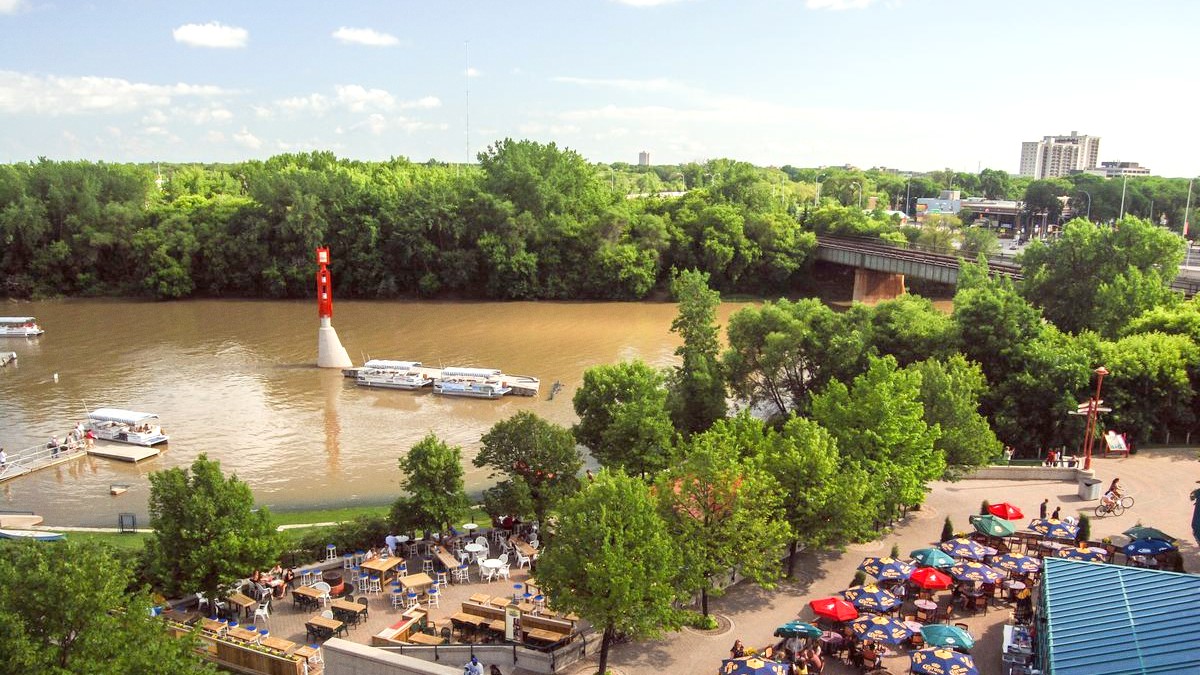
Manitoba, Canada
Winter (December - February): Winters are very cold, dry, and often sunny. Average daily temperatures range from -20°C to -12°C (-4°F to 10°F). Temperatures frequently drop below -30°C (-22°F), sometimes reaching -40°C (-40°F) with wind chill. Snowfall is common but not typically heavy. The air is generally dry.
Spring (March - May): Spring brings rapid warming and variable weather. Temperatures gradually climb from around 0°C (32°F) in March to 15°C (59°F) or higher by May. Snowmelt happens, and occasional rain showers are common. Frost can still occur in early spring.
Summer (June - August): Summers are warm to hot and often humid. Average daily temperatures range from 20°C to 26°C (68°F to 79°F). Highs frequently exceed 30°C (86°F), sometimes reaching 35°C (95°F) or more, especially with the humidex. Thunderstorms are common, bringing welcome relief from the heat. Humidity levels can be high.
Autumn (September - November): Autumn sees cooling temperatures and crisp air. Temperatures vary from 0°C to 15°C (32°F to 59°F). Frost becomes common by late October, and the first significant snowfalls may occur in November.
Extreme Temperatures: Winnipeg winters are among the coldest for major cities globally. Visitors must pack specialized cold-weather clothing for safety and comfort. Conversely, summers can bring heat waves, often with high humidity. Hydration and seeking shade are important.
Thunderstorms: Summer has frequent thunderstorms. These can be severe, bringing heavy rain, hail, or strong winds. Pay attention to local weather alerts.
Flooding: The Red River is prone to spring flooding. Winnipeg has extensive flood control measures, including the Red River Floodway, a large bypass channel, to protect urban areas from major inundations. While city-wide flooding is rare, localized flash flooding from intense summer rains can sometimes occur.
Museums and Indoor Attractions are accessible and comfortable year-round, offering a great escape from extreme weather in any season.
November - April
Best prices for flights and accommodation. Unique winter sports and festivals. Low tourist numbers.
Extremely cold temperatures. Shorter daylight. Some outdoor attractions closed. Cold-weather gear is a must.
May, September - October
Pleasant temperatures. Fewer crowds. Lower prices. Beautiful autumn foliage in late season.
Unpredictable weather. Reduced hours for some outdoor attractions.
June - August
Warm weather. City active with festivals. Parks are lush, long daylight hours. River activities.
Higher prices for flights and accommodation. More crowds. Hot and humid conditions. Mosquitoes are common.
Winnipeg winters are very cold, dry, and often sunny. Temperatures frequently drop below -30°C. Spring warms rapidly, with temperatures climbing from 0°C to 15°C. Snowmelt and occasional rain showers are common.
Summers are warm to hot and often humid, with average daily temperatures from 20°C to 26°C. Thunderstorms are common. Autumn sees cooling temperatures and crisp air, with temperatures from 0°C to 15°C. First significant snowfalls may occur in November.
Four distinct seasons with wide temperature swings.
Can reach -40°C with wind chill.
Can exceed 30°C with humidity.
Different experiences based on the time of year.
Spring and Autumn weather can be unpredictable.
Requirements vary based on your nationality.
Different nationalities have distinct visa processes for Canada.
Have all necessary documents ready for border officers.
Plan your budget for a trip to Winnipeg for a comfortable stay. Costs vary based on your travel style.
Here is a cost overview for different travel styles.
Budget Traveler: $70 - $120. Hostel dorm or basic motel ($30-$60). Groceries and casual dining ($25-$40). Public transit day pass ($10). Free attractions ($5-$10).
Mid-range Traveler: $150 - $250. Mid-range hotel/Airbnb ($100-$150). Mix of casual/sit-down restaurants ($50-$80). Public transit + occasional rideshare ($15-$25). Major attractions ($25-$50).
Daily Costs: $300+. High-end hotels ($200+). Fine dining ($100+). Frequent use of taxis/rideshare ($30+). Exclusive tours/experiences ($50+).
Premium experiences are at your fingertips.
Expect higher costs for convenience and exclusivity.
Daily Costs: $150 - $250. Comfortable hotel/Airbnb ($100-$150). Mixed dining ($50-$80). Public transit + occasional rideshare ($15-$25). Major attractions ($25-$50).
A good balance of comfort and value.
More spending for varied experiences.
Daily Costs: $70 - $120. Hostel dorm or basic motel ($30-$60). Groceries and casual dining ($25-$40). Public transit ($10). Free attractions ($5-$10).
Cost-effective travel with focus on free activities.
Limited options for high-cost experiences.
| Attraction | Cost (CAD) | Notes |
|---|---|---|
| Canadian Museum for Human Rights | $22 | Powerful exhibits. |
| Assiniboine Park Zoo | $22 | Includes Journey to Churchill exhibit. |
| The Forks National Historic Site | Free | Public areas free, some specific attractions may have fees. |
This section covers health requirements, common concerns, safety advice, and emergency information.
Dress in multiple layers of warm clothing, cover all exposed skin. Consider Thermal base layers and Warm winter boots.
Stay hydrated, seek shade, use Sunscreen. Avoid strenuous activity during peak heat.
Use Insect repellent with DEET. Wear long sleeves and pants in bushy areas.
Call 911 for police, fire, or ambulance services in an emergency.
Winnipeg has several major hospitals with emergency departments. Numerous walk-in clinics are available for non-emergency medical needs. Pharmacies are widely available for prescriptions and over-the-counter medications.
Non-residents are not covered by Canada's universal healthcare system. Medical treatment can be very expensive. A comprehensive Travel insurance policy is highly recommended.
Health Links - Info Santé (non-emergency health advice): Call 204-788-8200 or toll-free 1-888-315-9257.
Winnipeg is generally safe for tourists. Apply standard urban precautions.
Higher rates of petty crime (theft, panhandling) especially after dark. Be aware of your surroundings.
The Forks, Exchange District, Osborne Village, Assiniboine Park are generally safe and well-patrolled.
Be aware of seasonal weather hazards.
A comprehensive Travel insurance policy is highly recommended for all visitors to Canada. It covers various unforeseen circumstances.
Emergency medical expenses, including medical evacuation.
Trip cancellation or interruption due to unforeseen circumstances.
Baggage loss, theft, or delay. Personal liability coverage.